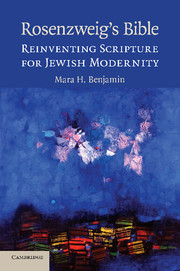Book contents
- Frontmatter
- Contents
- Acknowledgments
- Introduction: The Decline and Renewal of Scripture
- 1 Scripture in The Star of Redemption
- 2 Yehudah Halevi: The Creation of a Scriptural World
- 3 Bible Translation and the Shaping of German Identity
- 4 Toward a New Encounter with the Bible
- Conclusion: Scripture Today – Some Considerations
- Works Cited
- Index
Conclusion: Scripture Today – Some Considerations
Published online by Cambridge University Press: 01 July 2009
- Frontmatter
- Contents
- Acknowledgments
- Introduction: The Decline and Renewal of Scripture
- 1 Scripture in The Star of Redemption
- 2 Yehudah Halevi: The Creation of a Scriptural World
- 3 Bible Translation and the Shaping of German Identity
- 4 Toward a New Encounter with the Bible
- Conclusion: Scripture Today – Some Considerations
- Works Cited
- Index
Summary
This study emerged out of a desire to understand whether, and with what qualifications, “scripture” might have meaning for contemporary readers. I was drawn less to questions of specific corpora and more to the problem of how various intellectual and philosophical aspects of the modern period impinge upon and problematize pre-modern concepts of scripture and its uniquely authoritative status. Undertaking this inquiry required acknowledging the possibility that modern historical and scientific thinking, and the increasingly global perception of the world, have rendered “scripture” an antiquated and irrelevant construct for contemporary religious life. On the other hand, it also required considering the continuities between pre-modern notions of scripture and post-Enlightenment transformations of those assumptions. Finally, the task necessitated considering how the answers adopt different hues when one considers Jewish, rather than Christian, claims about scripture; general claims about the content and role and nature of scripture often mask partisan or parochial assumptions that break down when examined closely.
Franz Rosenzweig, as I have argued in this book, provides an especially inviting focus for pursuing these questions. His work reveals a rich and ongoing experimentation with investigating how scripture might have a role in the religious life of the modern individual and community.
- Type
- Chapter
- Information
- Rosenzweig's BibleReinventing Scripture for Jewish Modernity, pp. 171 - 184Publisher: Cambridge University PressPrint publication year: 2009



